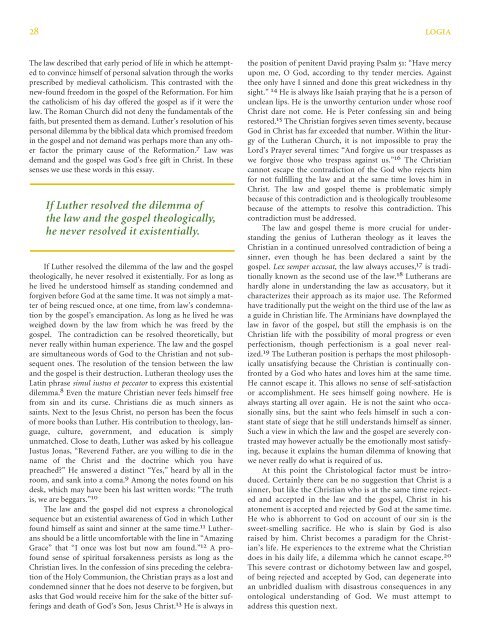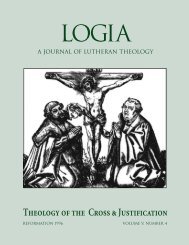03-1 Pastoral Care.pdf
03-1 Pastoral Care.pdf
03-1 Pastoral Care.pdf
- No tags were found...
You also want an ePaper? Increase the reach of your titles
YUMPU automatically turns print PDFs into web optimized ePapers that Google loves.
28 LOGIAThe law described that early period of life in which he attemptedto convince himself of personal salvation through the worksprescribed by medieval catholicism. This contrasted with thenew-found freedom in the gospel of the Reformation. For himthe catholicism of his day offered the gospel as if it were thelaw. The Roman Church did not deny the fundamentals of thefaith, but presented them as demand. Luther’s resolution of hispersonal dilemma by the biblical data which promised freedomin the gospel and not demand was perhaps more than any otherfactor the primary cause of the Reformation. 7 Law wasdemand and the gospel was God’s free gift in Christ. In thesesenses we use these words in this essay.If Luther resolved the dilemma ofthe law and the gospel theologically,he never resolved it existentially.If Luther resolved the dilemma of the law and the gospeltheologically, he never resolved it existentially. For as long ashe lived he understood himself as standing condemned andforgiven before God at the same time. It was not simply a matterof being rescued once, at one time, from law’s condemnationby the gospel’s emancipation. As long as he lived he wasweighed down by the law from which he was freed by thegospel. The contradiction can be resolved theoretically, butnever really within human experience. The law and the gospelare simultaneous words of God to the Christian and not subsequentones. The resolution of the tension between the lawand the gospel is their destruction. Lutheran theology uses theLatin phrase simul iustus et peccator to express this existentialdilemma. 8 Even the mature Christian never feels himself freefrom sin and its curse. Christians die as much sinners assaints. Next to the Jesus Christ, no person has been the focusof more books than Luther. His contribution to theology, language,culture, government, and education is simplyunmatched. Close to death, Luther was asked by his colleagueJustus Jonas, “Reverend Father, are you willing to die in thename of the Christ and the doctrine which you havepreached?” He answered a distinct “Yes,” heard by all in theroom, and sank into a coma. 9 Among the notes found on hisdesk, which may have been his last written words: “The truthis, we are beggars.” 10The law and the gospel did not express a chronologicalsequence but an existential awareness of God in which Lutherfound himself as saint and sinner at the same time. 11 Lutheransshould be a little uncomfortable with the line in “AmazingGrace” that “I once was lost but now am found.” 12 A profoundsense of spiritual forsakenness persists as long as theChristian lives. In the confession of sins preceding the celebrationof the Holy Communion, the Christian prays as a lost andcondemned sinner that he does not deserve to be forgiven, butasks that God would receive him for the sake of the bitter sufferingsand death of God’s Son, Jesus Christ. 13 He is always inthe position of penitent David praying Psalm 51: “Have mercyupon me, O God, according to thy tender mercies. Againstthee only have I sinned and done this great wickedness in thysight.” 14 He is always like Isaiah praying that he is a person ofunclean lips. He is the unworthy centurion under whose roofChrist dare not come. He is Peter confessing sin and beingrestored. 15 The Christian forgives seven times seventy, becauseGod in Christ has far exceeded that number. Within the liturgyof the Lutheran Church, it is not impossible to pray theLord’s Prayer several times: “And forgive us our trespasses aswe forgive those who trespass against us.” 16 The Christiancannot escape the contradiction of the God who rejects himfor not fulfilling the law and at the same time loves him inChrist. The law and gospel theme is problematic simplybecause of this contradiction and is theologically troublesomebecause of the attempts to resolve this contradiction. Thiscontradiction must be addressed.The law and gospel theme is more crucial for understandingthe genius of Lutheran theology as it leaves theChristian in a continued unresolved contradiction of being asinner, even though he has been declared a saint by thegospel. Lex semper accusat, the law always accuses, 17 is traditionallyknown as the second use of the law. 18 Lutherans arehardly alone in understanding the law as accusatory, but itcharacterizes their approach as its major use. The Reformedhave traditionally put the weight on the third use of the law asa guide in Christian life. The Arminians have downplayed thelaw in favor of the gospel, but still the emphasis is on theChristian life with the possibility of moral progress or evenperfectionism, though perfectionism is a goal never realized.19 The Lutheran position is perhaps the most philosophicallyunsatisfying because the Christian is continually confrontedby a God who hates and loves him at the same time.He cannot escape it. This allows no sense of self-satisfactionor accomplishment. He sees himself going nowhere. He isalways starting all over again. He is not the saint who occasionallysins, but the saint who feels himself in such a constantstate of siege that he still understands himself as sinner.Such a view in which the law and the gospel are severely contrastedmay however actually be the emotionally most satisfying,because it explains the human dilemma of knowing thatwe never really do what is required of us.At this point the Christological factor must be introduced.Certainly there can be no suggestion that Christ is asinner, but like the Christian who is at the same time rejectedand accepted in the law and the gospel, Christ in hisatonement is accepted and rejected by God at the same time.He who is abhorrent to God on account of our sin is thesweet-smelling sacrifice. He who is slain by God is alsoraised by him. Christ becomes a paradigm for the Christian’slife. He experiences to the extreme what the Christiandoes in his daily life, a dilemma which he cannot escape. 20This severe contrast or dichotomy between law and gospel,of being rejected and accepted by God, can degenerate intoan unbridled dualism with disastrous consequences in anyontological understanding of God. We must attempt toaddress this question next.
















